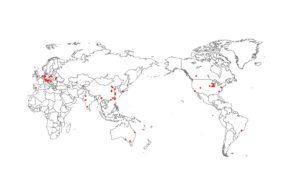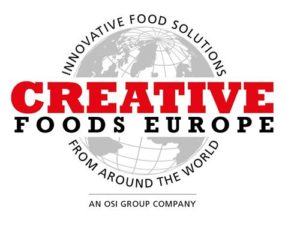The OSI Group continues to expand its multi-billion-dollar status in the food manufacturing industry with purchases of other food companies that align well with the company’s own values and goals. These values include a focus on continued expansion, globally and ecologically responsible practices, and a wide range of other beliefs that have guided the company since its founding. As a world leader, OSI provides custom solutions and quality products for food service and retail brands. The company’s productivity last year alone reflects its emphasis on growth with seven new facilities for processing and production around the globe.
These facilities will help the company pursue its mission of consistently providing the highest quality custom solutions designed to make food service and retail brands better able to serve their customers at a higher level of quality and dedication. The opening of these facilities also marks an impressive direction for the company, which continues to expand with no sign of slowing down any time in the near future. Meanwhile, OSI continues to develop new innovations and provide ever more effective products for their clients of food service industry leaders and highly respected retail brands within the United States and around the globe.
But what exactly is involved with all of this expansion being undertaken by OSI? And what can investors, industry leaders, and everyday people expect next from this giant of the food service and retail solutions industry? In this article, we’ll take a look. But first, it’s important to understand exactly where OSI came from and how they’ve come to occupy such a large space in their industry.
The History of OSI
The OSI Group remains a privately owned company, combining the efforts of a wide range of meat processing firms that serve retail and food service industry leaders throughout the world. With over 20,000 employees, OSI has come a long way from its beginnings a meat market opened by a German immigrant in 1909, in Oak Park, Illinois. As Otto’s meat market expanded to a wholesale meat trade, it became Otto & Sons and began to land more and more clients. By 1955, Otto & Sons became the first official supplier of a fast food restaurant who’s name you might recognize—McDonalds.
Since then, OSI has continued to grow with the launch of a high-volume meat plant in 1973, a partnership with General Milling Corporation in 1990, and continued growth through to the 2000s and beyond. It has since gone on to be featured on Forbes’ list of the largest private company, topping out at 63 in the Forbes list of 2018. The company has also been awarded the British Safety Council’s Globe of Honour, as well as other awards recognizing the company’s commitment to managing health and safety risks appropriately and robustly. They’ve also been recognized for environmental management efforts as well as their commitment to remaining focused on the health and happiness of their employees.
OSI now features plants in Chicago, Iowa, Utah, Wisconsin, California, and other locations. They produce many private label products as well a wide range of general meat products including hot dogs, pizza, pork, vegetables, doughs, poultry, bacon, and meat patties. They supply meat to companies including Subway, Pizza Hut, Papa John’s, Starbucks, and others—as well as being one of the largest single suppliers of meat products to McDonalds.
Pushing for Growth
 David McDonald, OSI Group president, acknowledges the company’s appetite for growth not only in capacity, but in other major respects as well. Its product development offers more to customers, he explains. By partnering with its clients on products that can help them grow their business, OSI encourages its suppliers to help them achieve increased sales. This has led to a dramatic increase in strategic partnerships that go beyond special shipping discounts or other incentives. OSI partners closely with companies to provide them with robust, customized programs for delivering exactly the products they need in the quantities they require. OSI also ensures a smooth logistical and shipping process so that their partners always have the products they need before they need them. The OSI partnering process gives demanding consumers more ways to “get what they want,” including natural and organic foods as well as the option to select premium specialties versus those that are merely affordable.
David McDonald, OSI Group president, acknowledges the company’s appetite for growth not only in capacity, but in other major respects as well. Its product development offers more to customers, he explains. By partnering with its clients on products that can help them grow their business, OSI encourages its suppliers to help them achieve increased sales. This has led to a dramatic increase in strategic partnerships that go beyond special shipping discounts or other incentives. OSI partners closely with companies to provide them with robust, customized programs for delivering exactly the products they need in the quantities they require. OSI also ensures a smooth logistical and shipping process so that their partners always have the products they need before they need them. The OSI partnering process gives demanding consumers more ways to “get what they want,” including natural and organic foods as well as the option to select premium specialties versus those that are merely affordable.
As the market has adapted, so too has OSI’s dedication to providing organic and natural options. More and more people are demanding these types of alternatives and assurances from their products, even within the fast food industry, so OSI has ensured that they’re always able to offer these specialty services whenever their patrons require them. This has been an instrumental piece of their ability to continue growing at such an accelerated rate with no sign of slowing. By continuously adapting to the fast-moving food service and retail industry, OSI has proven itself to be dedicated to remaining at the forefront of whatever comes next. The result? More and more potential customers have stood up and taken notice. Whatever comes next will determined
OSI also understands that retail and food service companies are facing increased interest from consumers when it comes to what exactly goes into their food, which is why OSI has made a continued effort to remain on top of whatever’s happening now and what’s going to come next.
But what do OSI’s valued, big-name clients have to say about OSI’s incredible growth metrics and continued expansion? The constant variable is that the food is both “healthy and tasty,” McDonald stated. As President, he credits Sheldon Lavin, CEO of OSI Group, with pushing the organization and creating the energy that makes it grow, offer more food choices and become “more significant” to customers. The growth plan for the company allows it to operate in 16 countries outside of the United States.
This international expansion has been a key growth indicator for the company, which operates in an industry that often struggles to thrive outside of the U.S. One of the challenges of international expansion is that different companies have different standards and regulations when it comes to health, ingredients, and conditions in OSI plants and processing factories. Meanwhile, international law can sometimes make transferring business overseas complicated. But OSI has been able to navigate these potential road blocks with poise and continued success, as they continuously expand into ever more markets that increase their foothold within the global food and retail industry.
The result is a company that’s an established powerhouse in the United States, and is already becoming increasingly established overseas thanks to their continued focus on international markets. OSI doesn’t consider the international market an afterthought, but rather an essential part of its strategy to expand to the four corners of the planet and provide excellent products and service to clients worldwide. They’ve already become major suppliers in China, as well as 15 other nations outside of the U.S. That figure is only expected to grow as OSI establishes partnerships and agreements with local governments and other companies to provide vital products and services worldwide.
That said, OSI also continues to find bright and inspired opportunities to expand here in the U.S. By constantly seeking out new markets, company partners, and opportunities for growth, OSI has consistently brought its services to more and more locations around the U.S. They’ve built processing plants nationwide and established world-class partnerships with some of the world’s biggest companies. The result has been an impressive recent track record for growth domestically and overseas. Let’s take a look at some of OSI’s most recent domestic growth news, followed by some of the most impressive ways they’re growing and expanding overseas.
Finding Expansion Opportunities at Home
OSI paid $7.4 million for a former Tyson Foods plant in Chicago, according to the Chicago Tribune. A spokesman for OSI Industries announced that the 200,000-square-foot facility provides support for “continued business growth.” This massive facility will allow for the facilitation of OSI’s goals of constantly being ahead of their demand. Rather than putting themselves in positions that necessitate quick action in order to keep up, OSI has always preferred to look at their long-term plans and projections for growth and take action accordingly. This large facility in Chicago will allow them to stay ahead of the projected growth that’s expected in the near future, without ever having to scramble to find more facilities to keep up with demand.
But what exactly is OSI producing that requires all of that physical space? The company’s line includes beef items such as meatballs and hamburgers, along with hot dogs, bacon and other pork items, as well as poultry and vegetable products. After a little more than a century in business, OSI ranks as one of the world’s largest privately-owned companies, according to Forbes. That said, OSI has tried to remain tuned into the actual needs of real customers—both their corporate customers, as well as the customers they serve on an individual basis.
Food service is about great food more than anything, and OSI has long prided itself on its ability to deliver exactly that. They also have established a reputation within the industry as one of the most dependable, ethically focused and respected names in the nation and around the world. This reputation has certainly helped contribute to their exponential growth worldwide.
Expanding in Europe
 With the purchase of Flagship Europe, OSI can provide resources for new clients in global markets for an already successful business. While OSI has already developed a robust presence in areas like Asia, they had as of recently made little inroads into Europe. That has all changed with the purchase of Flagship Europe, which will now give OSI a strong lead into European markets as well as the entire continent and its neighbors. The Flagship Europe line includes a variety of products that range from frozen poultry and pies to sandwich fillings, dips, marinades, sauces and dressings. This also means that not only will OSI have the opportunity to broaden its presence in Europe, but also offer a wider range of products and services than just meat-based production. With that, OSI has expanded beyond its humble beginnings as a meat provider at a local market in Chicago to become something much, much more.
With the purchase of Flagship Europe, OSI can provide resources for new clients in global markets for an already successful business. While OSI has already developed a robust presence in areas like Asia, they had as of recently made little inroads into Europe. That has all changed with the purchase of Flagship Europe, which will now give OSI a strong lead into European markets as well as the entire continent and its neighbors. The Flagship Europe line includes a variety of products that range from frozen poultry and pies to sandwich fillings, dips, marinades, sauces and dressings. This also means that not only will OSI have the opportunity to broaden its presence in Europe, but also offer a wider range of products and services than just meat-based production. With that, OSI has expanded beyond its humble beginnings as a meat provider at a local market in Chicago to become something much, much more.
OSI President David McDonald stated that the addition of Flagship to OSI Europe creates a “broader presence” on the continent. While it broadens the company’s ability to meet the “evolving needs” of its customers, it complements the current processing strengths of OSI. That means that OSI will be able to produce new products in a new market without having to compromise on the level of quality for which it become so well-known. The result will be a greater European presence, more satisfied customers both on the corporate and individual level, and a positive reputation for OSI in global markets beyond the United states. This will result in what OSI believes will be a stronger grasp on the food production market than ever before. But OSI wasn’t done adding European connections when they purchased Flagship Europe. In fact, the established company was just getting started.
Baho Food, a Dutch manufacturer of convenience foods, snacks and deli meats has joined OSI, further expanding the company’s presence in Europe. The five Baho subsidiaries have processing plants in Germany as well as the Netherlands, serving 18 European countries. Baho brings its managing director as well as its line managers to OSI in the transaction to work with executives in developing a growth strategy that can advance the newly combined companies. Officials tout the deal for its potential to accelerate growth and reach new customers with a “broader product portfolio.”
In fact, accessing these 18 European countries means that OSI will more than double their current reach by country. Previously, OSI operated in 15 foreign countries and the United states. This deal will ultimately raise that number to over 30. This is yet another example of OSI becoming one of the fastest and most dependably growing companies currently visible on the market, particularly within the food production industry as a provider for retail and food service companies worldwide.
Focusing on Global Growth
While maintaining its headquarters in Aurora, Ill., OSI recognizes that global companies are “local in nature” and cannot run a “one-size-fits-all” business. What that means is that OSI doesn’t expect to be able to supply food to foreign markets around the world without developing a real understanding of their unique needs, cultural differences, and markets. They believe that every nation, market, and company is different, and thus will require different services and products to thrive.
A corporate decision to expand to China in 1992 enforced that world view. Local businesses can cope with government regulations and cultural differences as well as customers’ taste preferences better than an operation half a world away, according to the philosophy of David McDonald, president of OSI Group. This is also a powerful PR strategy that makes their presence in foreign markets less susceptible to local skepticism. When they can show they’ve invested in the local community and in understanding its unique position, OSI has engendered more trust from local enterprises and organizations. The company views its position as a global leader as one that runs a large-scale operation but maintains local management teams who “understand local cultures and tastes.” This also helps OSI remain agile and able to adapt quickly on a local scale—important changes at specific locations don’t have to grind slowly through the gears of main headquarters.
Recognizing a Powerful Influence
As the energy force behind OSI’s growth and expansion, Sheldon Lavin, CEO of OSI Group has an academic background in finance and accounting that inspired him to pursue owning a business. As a financial consultant who arranged the Kolschowsky family’s first meat processing facility, he got to know Otto and his sons, the “O” and “S” in the business that Lavin now owns. His vision for the company was to make it a “world class enterprise.” It would be difficult for any critic to argue that they haven’t done exactly that, expanding their reach to dozens of companies and providing products for the world’s largest retail and food service enterprises around the globe. So what exactly is next for OSI, and what does the current CEO see as being in store for the company moving forward—both short-term and long-term?
He stated that innovation was always in his DNA, but it got a boost from his work at OSI. OSI has fostered and grown his belief in creating dependably good products with reliably great service. With a goal of making it an entrepreneurial company, he wanted it to avoid sending dictates from top management and rather trusting local managers and employees to take ownership over the company’s success and trust their instincts for making important decisions. By designing it to operate as a family, he established a culture that was the best way for his company to do business. The result of his innovative management style is more than 65 facilities in 17 countries and the production of primarily protein products and some vegetable items, sauces and baked goods.




